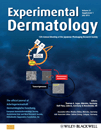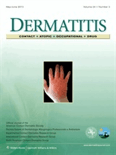
VETERINARY DERMATOLOGY
Scope & Guideline
Advancing veterinary skin health through innovative research.
Introduction
Aims and Scopes
- Clinical Dermatology and Therapeutics:
The journal emphasizes clinical research on dermatological conditions in animals, including innovative treatment options and therapeutic efficacy studies, particularly focusing on conditions like canine atopic dermatitis and pyoderma. - Microbiome and Skin Health:
A significant area of focus is the role of the skin microbiome in health and disease, exploring how microbial communities affect skin conditions and treatments, including studies on antimicrobial resistance and biofilm formation. - Immunology and Allergic Reactions:
Research on the immunological aspects of skin diseases is prevalent, including studies on cytokines, immunotherapy protocols, and the mechanisms underlying allergic reactions in animals. - Surgical and Diagnostic Techniques:
The journal also covers advancements in surgical techniques and diagnostic methods, including the use of dermoscopy, biopsy, and molecular techniques for accurate diagnosis of complex dermatological conditions. - Comparative Dermatology:
The journal provides insights into dermatological issues across different species, contributing to a comparative understanding of skin diseases in both domestic and exotic animals.
Trending and Emerging
- Innovative Therapies and Treatments:
There is a notable increase in studies focusing on novel therapeutic approaches, such as biologics and immunotherapy, particularly targeting conditions like atopic dermatitis and autoimmune skin diseases. - Genetic and Molecular Research:
Research delving into the genetic basis of skin diseases and the molecular mechanisms underlying these conditions is on the rise, signifying a shift toward understanding the pathophysiology at a deeper level. - Impact of Environmental Factors:
Emerging themes include the influence of environmental factors, such as climate and urbanization, on skin health and disease prevalence, reflecting growing concerns about the impact of external conditions on animal welfare. - Interdisciplinary Approaches:
The integration of technologies such as artificial intelligence, machine learning, and advanced imaging techniques in diagnosing and managing dermatological conditions is becoming more prevalent. - Holistic and Integrative Medicine:
An increasing interest in holistic approaches, including the use of nutraceuticals and alternative therapies, is evident, suggesting a broader perspective on animal health and well-being.
Declining or Waning
- Traditional Pharmacological Approaches:
There appears to be a waning interest in conventional pharmacological treatments for dermatological conditions, as newer therapies and holistic approaches gain traction. - Epidemiological Studies:
Although still important, the frequency of epidemiological studies focusing solely on the prevalence of skin diseases has decreased, possibly due to a shift toward more targeted research on treatment outcomes and mechanisms. - Veterinary Education and Training:
Research specifically addressing veterinary education related to dermatology seems to be less frequently published, indicating a potential underrepresentation of educational methodologies in the field.
Similar Journals

Skin Appendage Disorders
Unveiling the Complexities of Skin AppendagesSkin Appendage Disorders, published by KARGER, is an esteemed academic journal focusing on the intricate realm of dermatology, particularly the structure and function of skin appendages. Established in 2016 and projected to continue through 2024, this journal has swiftly gained recognition, securing a respectable Q2 ranking in the field of Dermatology as of 2023, and achieving a Scopus rank of 76 out of 142 in the same category. With an ISSN of 2296-9195 and an E-ISSN of 2296-9160, the journal presents a platform for innovative research and clinical findings that address the multifaceted aspects of skin appendage disorders. Researchers, practitioners, and students will find significant value in its open access model, which encourages widespread dissemination of knowledge and fosters collaboration within the dermatological community. By publishing high-quality peer-reviewed articles, Skin Appendage Disorders aims to elevate the understanding of dermatological conditions and contribute to advancements in therapeutic practices, making it a vital resource for those dedicated to skin health.

SKIN RESEARCH AND TECHNOLOGY
Elevating Knowledge in Skin Research and Clinical Practices.SKIN RESEARCH AND TECHNOLOGY, a distinguished publication by Wiley, stands at the forefront of dermatological science, emphasizing innovative research and technological advances in skin health. With an ISSN of 0909-752X and an E-ISSN of 1600-0846, this journal serves as a vital platform for researchers and professionals to present their findings and engage in discussions surrounding skin biology, clinical practices, and therapeutic technologies. As evidenced by its respectable Q2 ranking in the dermatology category for 2023 and a Q3 status in miscellaneous medicine, the journal attracts a broad readership and contributes significantly to the field. Housed in the United Kingdom with publications spanning from 1995 to 2024, SKIN RESEARCH AND TECHNOLOGY continues to foster innovation and knowledge dissemination in skin-related research. While its Access options are not open, the impact of the journal remains prominent, appealing to academic professionals and students eager to explore emerging trends and advancements in dermatological studies.

Annals of Dermatology
Transforming the landscape of dermatological knowledge.Annals of Dermatology is a prestigious academic journal published by the Korean Dermatological Association, focusing on the latest research and advancements in the field of dermatology. With a commitment to advancing knowledge in skin health and disease, this journal serves as a vital resource for researchers, clinicians, and students working in dermatology and related disciplines. Since its inception in 1989, it has evolved to consolidate its position in the academic community, boasting a Q2 ranking in the 2023 Dermatology category and a Scopus rank of #87 out of 142, placing it in the 39th percentile. Although it operates under a subscription model, the journal's impact factor reflects its significance in advancing dermatological research, attracting innovative studies and reviews that shape clinical practice. With a publication history extending from 1989 to 1996 and then from 2008 to the present, Annals of Dermatology continues to be an essential publication for those devoted to improving skin health.

EXPERIMENTAL DERMATOLOGY
Unveiling Innovations in Dermatological ResearchEXPERIMENTAL DERMATOLOGY, published by WILEY, is a leading journal in the fields of Biochemistry and Dermatology, with impressive rankings including Q1 status in both categories as of 2023. With its ISSN 0906-6705 and E-ISSN 1600-0625, the journal offers a reputable platform for disseminating cutting-edge research and insights into skin biology and related health issues. As a pivotal resource for professionals, researchers, and students alike, EXPERIMENTAL DERMATOLOGY includes a broad scope of topics, fostering a deeper understanding of dermatological conditions and enhancing new therapeutic strategies. The journal’s distinguished performance is highlighted by its Scopus rankings, which place it at the 91st percentile in Medicine-Dermatology and the 65th in Biochemistry. While not an open-access publication, the journal remains committed to ensuring the accessibility of crucial developments within the dermatological community worldwide, facilitating the advancement of both clinical practice and academic inquiry.

Dermatologie in Beruf und Umwelt
Transforming Understanding of Skin Health in the WorkplaceDermatologie in Beruf und Umwelt is a reputable journal published by DUSTRI-VERLAG DR KARL FEISTLE, focusing on the intersection of dermatology, occupational health, and environmental influences on skin health. With its ISSN 1438-776X and E-ISSN 1616-7090, this journal serves as a crucial platform for disseminating research findings and clinical practices that address the dermatological concerns arising in diverse occupational settings. Although the journal's coverage in Scopus concluded in 2021, it remains significant within the medical community, evidenced by its rankings within the 29th percentile in Medicine - Dermatology and 20th percentile in Medicine - Public Health, Environmental and Occupational Health. While it follows a traditional access model, its commitment to enhancing knowledge and promoting best practices in skin health makes it an essential resource for researchers, clinicians, and public health professionals eager to explore the complex relationship between work environments and dermatological outcomes.

Postepy Dermatologii i Alergologii
Championing open access to vital health insights.Postepy Dermatologii i Alergologii is a distinguished Open Access journal published by TERMEDIA PUBLISHING HOUSE LTD, dedicated to advancing the fields of Dermatology and Immunology and Allergy. Since its inception in 2003, this journal has served as a vital platform for researchers and practitioners alike, promoting knowledge sharing and collaboration in Poland and beyond. With a current impact ranking placing it in the Q3 quartile for both Dermatology and Immunology and Allergy categories, it plays a significant role in contributing to academic discourse within these fields. The journal is indexed in Scopus, with respectable rankings reflecting its relevance and quality—#65/142 in Dermatology and #163/233 in Immunology and Allergy. Researchers are encouraged to explore a vast array of innovative studies and reviews, making it an essential resource for anyone seeking to stay at the forefront of dermatological and allergic research. For those interested in discovering groundbreaking findings and contributing to the ongoing dialogue in these disciplines, Postepy Dermatologii i Alergologii offers not only free accessibility but also a commitment to scholarly excellence.

Dermatitis
Advancing the Science of Skin HealthDermatitis, published by MARY ANN LIEBERT, INC, is a leading journal that focuses on the study of skin inflammation and allergic reactions, making significant contributions to the fields of Dermatology, Immunology, and Allergy. With an ISSN of 1710-3568 and an E-ISSN of 2162-5220, this peer-reviewed journal serves as a critical platform for researchers, healthcare professionals, and students alike, eager to share and explore groundbreaking findings and developments. Recognized for its impact and rigorous scholarly standards, Dermatitis has achieved a Q2 quartile ranking in dermatology and a Q3 ranking in immunology and allergy as of 2023, underscoring its significance in these vital medical sectors. The journal's Scopus ranking places it in the 84th percentile for dermatology and the 50th percentile for immunology and allergy, reflecting its wide acceptance and influence. With a scope spanning from 2004 to 2024, Dermatitis invites original research, reviews, and clinical updates that advance the understanding of skin disorders and therapy innovations, solidifying its role as an essential resource in enhancing skin health worldwide.

Acta Dermatovenerologica Croatica
Bridging Knowledge Gaps in Dermatology and VenereologyActa Dermatovenerologica Croatica is a premier journal dedicated to the fields of dermatology and venereology, published by the Croatian Dermatovenereological Society. Established in 1994, this journal has been a vital platform for disseminating research and advancements in the understanding and treatment of skin diseases and sexually transmitted infections. Although it is currently classified in the Q4 quartile for dermatology, infectious diseases, and miscellaneous medicine, it provides a unique opportunity for emerging researchers and seasoned professionals to contribute to a growing body of knowledge. Based in Zagreb, Croatia, the journal emphasizes free access to information that enhances clinical practices and scientific understanding among dermatologists and venereologists worldwide. As the journal approaches its 30th anniversary, it continues to aim for excellence in research quality, fostering collaboration, and innovating in the ever-evolving fields it represents.

Turk Dermatoloji Dergisi-Turkish Journal of Dermatology
Fostering collaboration for a healthier skin future.Turk Dermatoloji Dergisi-Turkish Journal of Dermatology, published by Wolters Kluwer Medknow Publications, is a prominent platform dedicated to advancing the field of dermatology in Turkey and beyond. With an ISSN of 1307-7635 and an E-ISSN of 1308-5255, this journal plays a vital role in disseminating contemporary research and clinical advancements within the domain. While it is positioned in the Q4 quartile of dermatology journals, its contributions are essential for academics, medical practitioners, and students averse to the latest trends and breakthroughs in skin health. The journal assures accessibility to a broad audience, fostering knowledge exchange, collaboration, and innovation. Given its unique perspective rooted in Turkish dermatological practices, the Turkish Journal of Dermatology serves as a significant resource for enhancing professional competence and driving forward the science of dermatology through its vivid discussions and case studies. For researchers seeking a dedicated venue to publish their work or for professionals eager to stay informed, this journal is an indispensable resource in the ever-evolving landscape of dermatology.

BRITISH JOURNAL OF DERMATOLOGY
Exploring the frontiers of skin science and treatment.The British Journal of Dermatology, published by Oxford University Press, stands as a premier platform for advancing the field of dermatological research and clinical practice since its inception in 1892. With a strong commitment to disseminating high-quality research, this esteemed journal is currently ranked in the Q1 category for both Dermatology and Miscellaneous Medicine in 2023, reflecting its influential position in the academic landscape. As the leading journal in its field, it enjoys a robust Scopus ranking of #1 out of 142 in dermatology, placing it in the 99th percentile globally. The journal covers a wide scope of subjects pertinent to dermatology, including clinical trials, treatment innovations, and epidemiological studies, making it an essential resource for researchers, healthcare professionals, and students alike. Although it is not an open-access publication, it ensures a broad reach through institutional subscriptions, fostering knowledge exchange across the global dermatological community. Based in the heart of the United Kingdom, the British Journal of Dermatology continues to play a crucial role in shaping the future of skin health and disease management.